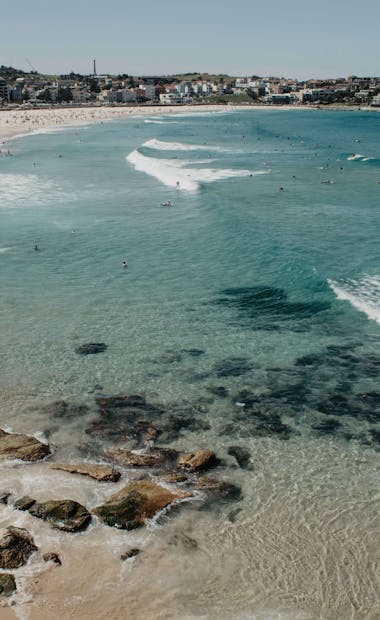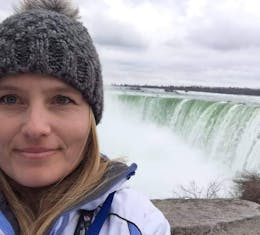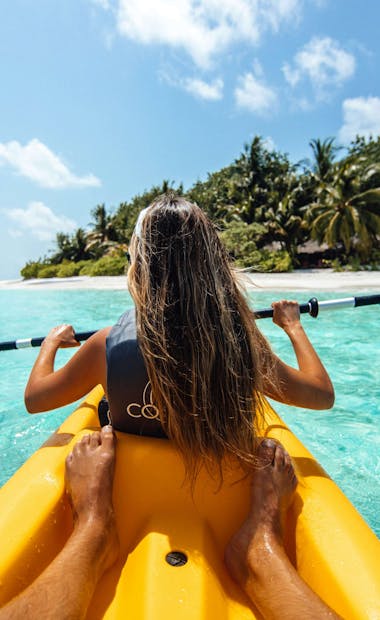
Australia East Coast Tours
Explore the worlds most magical coast.
Popular tours
- Save1%
 View Tour
View TourAustralia East Coast - 43 Days
- Sydney to Cairns
- Age group: 18 - 35
- Max group size: 24
Was:£3,848From£3,809 - Save1%
 View Tour
View TourAustralia East Coast Highlights - 21 Days
- Sydney to Cairns
- Age group: 18 - 35
- Max group size: 24
Was:£2,440From£2,416  View Tour
View TourEast Coast Australia - 36 Days
- Sydney to Cairns
- Age group: 18 - 35
- Max group size: 24
From£3,012- Save1%
 View Tour
View TourEast Coast Australia Adventure - 19 Days
- Sydney to Cairns
- Age group: 15 - 99
- Max group size: 16
Was:£4,740From£4,693 - Save11%
 View Tour
View TourMost of the Coast: Sydney to Cairns - 16 Days
- Sydney to Cairns
- Age group: 18 - 39
- Max group size: 20
Was:£2,739From£2,440  View Tour
View TourOz East Coast Adventure - 20 Days
- Brisbane to Cairns
- Age group: 18 - 49
- Max group size: 22
From£2,149
Australia East Coast
Welcome to the mesmerising haven of the East Coast of Australia, where nature’s diversity unfolds in a spectacular symphony of lush rainforests, golden beaches, and vibrant cities. As you journey along this enchanting coastline, you’ll find yourself embraced by a tapestry of unforgettable experiences, each moment brimming with the spirit of adventure and awe.
Picture the dazzling Great Barrier Reef, a kaleidoscope of marine life and coral that stretches as far as the eye can see—a paradise for snorkelling, diving, or simply marvelling at its grandeur. Explore the verdant rainforests of the Daintree, where ancient trees whisper secrets of a world untouched by time. Stroll the iconic sands of Bondi Beach, where the surf meets the bustling energy of Sydney, or soak up the laid-back charm of Byron Bay, where the horizon meets serenity.
Why should you choose this coastal odyssey? The East Coast of Australia promises something for every traveller. Thrill-seekers can ride the waves at Surfers Paradise, zip-line through the treetops of Cape Tribulation, or white-water raft along the Tully River. For those yearning for cultural immersion, the vibrant art scene of Brisbane, the history-laden streets of Sydney’s The Rocks, and the thriving Indigenous heritage of the region await discovery. Wildlife lovers will be enchanted by koalas in Port Stephens, kangaroos on Pebbly Beach, and the majestic humpback whales that migrate along the coast.
The East Coast of Australia is more than a destination; it’s an invitation to uncover the extraordinary, to savour the contrasts of nature and city life, and to create memories that will last a lifetime. Join us at The Adventure People as we design tailor-made journeys that reflect the magic of this remarkable stretch of the world, ensuring your adventure is nothing short of extraordinary.
Come, let’s write your East Coast Australian story of exploration and wonder.
What is the best time to visit eastern Australia?
The best time to visit eastern Australia depends on your preferences and the specific activities or regions you'd like to explore, as the climate varies across this vast area. Here's a breakdown:
1. Spring (September to November) – Best Overall
- Why Visit? Mild temperatures, blooming flowers, and fewer crowds make spring an excellent time for most activities.
- Weather: Temperatures range from 15–25°C (59–77°F) in most areas. The humidity is low, especially in northern Queensland.
- Highlights:
- Snorkelling and diving in the Great Barrier Reef under optimal conditions.
- Enjoying whale watching along the coast, particularly in places like Hervey Bay.
- Exploring Sydney and its surrounds, with comfortable weather for sightseeing and hiking.
2. Summer (December to February) – Beach Lovers and Festive Vibes
- Why Visit? It's summer holiday season in Australia, perfect for beach trips and outdoor festivals.
- Weather: Hot and humid in Queensland (28–34°C or 82–93°F), warm and drier in New South Wales and Victoria (22–30°C or 72–86°F).
- Highlights:
- Relaxing on famous beaches like Bondi Beach, Byron Bay, and Whitehaven Beach.
- Experiencing New Year’s Eve fireworks over Sydney Harbour.
- Adventuring in tropical rainforests like the Daintree, though occasional rain is expected.
Note: Summer is cyclone season in northern Queensland (e.g., Cairns), so check weather forecasts before visiting.
3. Autumn (March to May) – Pleasant and Peaceful
- Why Visit? This season offers fewer crowds and cooler weather, ideal for exploring cities, hiking, and wine regions.
- Weather: Mild temperatures (15–25°C or 59–77°F) and less humidity than summer.
- Highlights:
- Touring wine regions like the Hunter Valley or Yarra Valley.
- Hiking in Blue Mountains or Grampians National Park.
- Enjoying festivals like the Sydney Royal Easter Show.
4. Winter (June to August) – Cooler Temperatures and Unique Experiences
- Why Visit? Perfect for skiing, whale watching, and escaping the northern hemisphere summer heat.
- Weather: Cooler in Sydney and Melbourne (10–17°C or 50–63°F), mild in Queensland (17–26°C or 63–79°F).
- Highlights:
- Whale watching on the east coast, especially around Hervey Bay.
- Skiing or snowboarding in the Snowy Mountains or Victoria's alpine regions.
- Exploring Queensland's tropical north, like Cairns and the Whitsundays, with dry and comfortable weather.
Verdict: Best Time to Visit
- For Beaches and the Great Barrier Reef: April to November (avoid summer cyclones).
- For Cities and Cultural Experiences: September to November or March to May.
- For Outdoor Adventures (Hiking/Skiing): Autumn or winter, depending on your preference.
Spring (September to November) strikes the best balance across all activities, offering pleasant weather, fewer crowds, and stunning natural beauty.
What are the must see places in eastern Australia?
Eastern Australia is packed with iconic destinations and hidden gems. Here’s a guide to the must-see places, grouped by state and territory, to help you craft an unforgettable itinerary:
1. Queensland
- Great Barrier Reef: A UNESCO World Heritage site and one of the world’s natural wonders, perfect for snorkelling, diving, or scenic flights.
- Daintree Rainforest: The world’s oldest tropical rainforest, offering treetop walks, waterfalls, and the chance to spot unique wildlife.
- Whitsundays: A group of 74 idyllic islands, home to Whitehaven Beach with its impossibly white sand and azure waters.
- Gold Coast: Famous for its beaches, theme parks (like Dreamworld and Sea World), and vibrant nightlife.
- Fraser Island: The largest sand island in the world, known for its crystal-clear freshwater lakes and 4WD adventures.
- Cairns & Port Douglas: Gateways to the Great Barrier Reef and Daintree, offering laid-back tropical vibes.
2. New South Wales
- Sydney:
- Sydney Opera House: An architectural icon and must-visit landmark.
- Sydney Harbour Bridge: Climb it for panoramic city views.
- Bondi Beach: Perfect for surfing and coastal walks.
- Blue Mountains: Known for dramatic cliffs, eucalyptus forests, and the iconic Three Sisters rock formation.
- Hunter Valley: One of Australia’s premier wine regions, ideal for wine tastings and gourmet food.
- Byron Bay: A bohemian coastal town famous for its beaches, lighthouse, and relaxed atmosphere.
- Lord Howe Island: A hidden gem with pristine beaches, coral reefs, and hiking trails.
- Jervis Bay: Known for its incredibly white sand beaches and dolphin-watching cruises.
3. Victoria
- Melbourne: A cultural hub known for its coffee, laneway street art, and vibrant food scene.
- Great Ocean Road: Drive along this stunning coastal route to see the Twelve Apostles, Loch Ard Gorge, and other dramatic landscapes.
- Phillip Island: Famous for its nightly Penguin Parade, where little penguins waddle ashore.
- Yarra Valley: A stunning wine region with cellar doors, hot air ballooning, and fresh local produce.
- Grampians National Park: Perfect for hiking, with dramatic sandstone peaks, waterfalls, and Aboriginal rock art.
- Wilson’s Promontory: Known for its beaches, granite mountains, and native wildlife.
4. Tasmania (if you include southeastern Australia)
- Hobart & MONA: Explore the capital city and the avant-garde Museum of Old and New Art.
- Freycinet National Park: Home to Wineglass Bay, one of the most beautiful beaches in the world.
- Cradle Mountain: Hike amidst dramatic alpine scenery and pristine lakes.
5. Australian Capital Territory (ACT)
- Canberra:
- Australian War Memorial: A moving tribute to Australia’s military history.
- Parliament House: Explore Australia’s political heart.
- National Gallery of Australia: Home to incredible Indigenous and modern art.
6. Additional Highlights
- Kosciuszko National Park (NSW/VIC border): Home to Australia’s highest peak and stunning alpine scenery.
- Snowy Mountains: Perfect for skiing in winter or hiking in summer.
- Hervey Bay (QLD): A whale-watching hotspot, particularly during migration season.
Suggested Itinerary
- Tropical Wonders: Cairns → Daintree → Great Barrier Reef → Whitsundays.
- City to Surf: Sydney → Blue Mountains → Byron Bay.
- Coastal Drives: Great Ocean Road → Melbourne → Phillip Island.
- Wildlife & Wilderness: Fraser Island → Wilsons Promontory → Grampians.
These destinations showcase the diversity of eastern Australia, offering everything from bustling cities to tranquil beaches, lush rainforests, and rugged landscapes.
Do I need a visa to enter eastern Australia?
Whether you need a visa to enter Australia depends on your nationality and the purpose of your visit. Here’s a general guide:
1. Visitors from the United Kingdom
- Yes, you need a visa.
- British citizens can apply for an Electronic Travel Authority (ETA) or an eVisitor visa for short stays (up to 3 months per visit) for tourism, business, or family visits.
2. Visa Options for Tourists
eVisitor Visa (Subclass 651):
- Free of charge.
- Available for citizens of the UK and other European countries.
- Allows multiple entries within a 12-month period, with each stay lasting up to 3 months.
- Apply online through the Australian Home Affairs website.
Electronic Travel Authority (ETA) (Subclass 601):
- Similar to the eVisitor visa but available to a wider range of nationalities.
- Costs AUD 20.
- Can be applied for via the Australian ETA app or through certain travel agents.
3. Key Points to Remember
- Application Time: Apply well in advance, although most visas are processed quickly (within 1–2 days).
- Passport Validity: Ensure your passport is valid for at least 6 months beyond your intended stay.
- Health Insurance: While not mandatory for tourists, it’s highly recommended to have travel health insurance, as medical care in Australia can be expensive.
4. Special Cases
- Longer Stays or Work: If you plan to stay longer than 3 months, work, or study, you’ll need a different visa (e.g., Working Holiday Visa or Visitor Visa Subclass 600).
- Non-UK Nationals: Check your country’s specific visa requirements through the Australian Government's Visa Finder.
Summary
As a British citizen, you will need either an eVisitor visa (free) or an ETA (AUD 20) to travel to eastern Australia. Both are quick and straightforward to apply for online.
How long does it take to travel to Australia from the UK?
The duration of a flight from the United Kingdom (UK) to Australia varies depending on factors such as the departure and arrival cities, flight routes, and layovers. Here are some approximate flight times for direct flights from major UK airports to popular Australian cities:
London to Sydney: Direct flights typically take around 21 to 23 hours. Some flights may have layovers, which can extend the total travel time.
London to Melbourne: Direct flights generally take around 21 to 23 hours. Like the Sydney route, there may be flights with layovers that could lengthen the total journey time.
London to Perth: Non-stop flights from London to Perth typically take around 17 to 18 hours.
London to Brisbane: Direct flights from London to Brisbane generally take around 21 to 23 hours, with possible layovers.
London to Cairns: Flights from London to Cairns usually have one or two layovers, and the total travel time can range from 23 to 25 hours or more.
Please note that these are approximate flight durations and can vary depending on factors such as the airline, flight schedule, and any layovers. It's advisable to check with airlines or travel agents for the most accurate and up-to-date information regarding flight durations and itineraries.
Is Australia a safe destination?
Australia is generally considered a safe destination for travellers. The country has a stable political system, well-developed infrastructure, and a low crime rate compared to many other countries. However, as with any travel destination, it's always important to take precautions and be aware of your surroundings. Here are a few safety tips to keep in mind when visiting Australia:
Personal Safety: Australia is generally safe for tourists, but it's always wise to take common-sense precautions. Keep an eye on your belongings, especially in crowded areas and tourist hotspots. Avoid displaying expensive items and be cautious when using ATMs or carrying cash. Use reputable transportation services and be aware of your surroundings, especially at night.
Natural Hazards: Australia is known for its diverse and sometimes harsh natural environment. Be aware of the potential risks associated with the Australian bush, beaches, and national parks. Follow safety guidelines, obey warning signs, and seek local advice when engaging in outdoor activities.
Sun Protection: Australia has a high level of ultraviolet (UV) radiation due to its location near the equator and the hole in the ozone layer. Protect yourself from the sun by wearing sunscreen, a hat, sunglasses, and lightweight clothing that covers your skin. Stay hydrated and seek shade during the hottest parts of the day.
Wildlife: Australia is home to unique and often fascinating wildlife. While encounters with wildlife can be a highlight of your trip, it's important to remember that some animals can pose risks. Respect their natural habitats, avoid approaching or feeding wild animals, and follow any guidelines provided by wildlife authorities.
Road Safety: If you plan to drive in Australia, familiarize yourself with the local road rules and conditions. Australia has vast distances between cities, and driving long distances can be tiring. Take regular breaks, observe speed limits, and be cautious of wildlife on the roads, particularly in rural areas.
Emergency Services: Australia has efficient emergency services, including police, ambulance, and fire departments. In case of an emergency, dial 000 for immediate assistance.
It's always a good idea to have travel insurance that covers medical expenses, trip cancellations, and other unforeseen circumstances. Stay informed about local conditions and follow any travel advisories issued by your home country's government.
By taking basic precautions and being mindful of your safety, you can have a safe and enjoyable experience exploring all that Australia has to offer.
Do I require any vaccinations to visit Australia?
No specific vaccinations are required to enter Australia unless you have visited or transited through a country with a risk of yellow fever within six days before your arrival. In that case, you may need to provide proof of yellow fever vaccination.
However, it is always a good idea to ensure that your routine vaccinations are up to date before traveling to any destination, including Australia. These may include vaccinations for measles, mumps, rubella (MMR), diphtheria, tetanus, pertussis (whooping cough), varicella (chickenpox), and influenza. Vaccination recommendations may vary depending on your age, health condition, and specific travel plans, so it is best to consult with a healthcare professional or travel medicine specialist for personalised advice.
It's also worth considering other factors such as the activities you plan to engage in and the regions you'll be visiting within Australia. For example, if you plan to spend time in rural or remote areas, it may be prudent to discuss vaccinations for diseases like hepatitis A, typhoid, or meningococcal disease.
It's important to note that health recommendations can change, so it's advisable to consult with a healthcare professional or refer to official sources such as the Centers for Disease Control and Prevention (CDC) or the World Health Organisation (WHO) for the most up-to-date and accurate information on vaccinations for travel to Australia.
What is the local currency in Australia, and can I use credit cards?
The currency of Australia is the Australian Dollar (AUD). The currency is denoted by the symbol "$" or "A$". The Australian Dollar is subdivided into 100 cents, and coins come in denominations of 5, 10, 20, and 50 cents, as well as $1 and $2 coins. Banknotes are issued in denominations of $5, $10, $20, $50, and $100.
When visiting Australia, it's a good idea to have some local currency on hand for small purchases, public transportation, and other cash transactions. ATMs (Automatic Teller Machines) are widely available throughout the country, and major credit cards are widely accepted at hotels, restaurants, and larger establishments. However, it's always a good idea to have some cash for situations where cards may not be accepted or for smaller businesses that may prefer cash.
Currency exchange services can be found at international airports, major cities, and tourist areas. Banks and authorised currency exchange offices offer currency exchange services, but it's advisable to compare exchange rates and fees to ensure you get a favourable rate.
If you plan to use your credit or debit card in Australia, notify your bank or card issuer in advance about your travel plans to avoid any potential issues with card usage.
Overall, accessing and using your money in Australia is typically straightforward, and the country has a well-developed banking and financial system to facilitate currency exchange and transactions.
Is eastern Australia a good destination for solo travellers?
es, eastern Australia is an excellent destination for solo travellers! It offers a fantastic mix of vibrant cities, stunning landscapes, and friendly locals, making it a safe and exciting place to explore on your own. Here’s why it’s ideal, along with some tips:
Why Eastern Australia is Great for Solo Travellers
1. Ease of Travel
- Public Transport: Major cities like Sydney, Melbourne, and Brisbane have excellent public transport systems, making it easy to get around.
- Tours and Groups: There are plenty of group tours to iconic destinations like the Great Barrier Reef, Fraser Island, and the Blue Mountains, where you can meet like-minded travellers.
2. Safety
- Australia is considered one of the safest countries for solo travel. Cities and tourist areas are generally well-policed, and locals are helpful and welcoming.
- Emergency services are reliable, and most areas have good mobile reception.
3. Friendly Locals and Travellers
- Australians are known for their laid-back, friendly attitude. You’ll find it easy to strike up conversations or ask for help.
- The east coast is a hotspot for solo travellers and backpackers, so you'll often find hostels, cafés, and bars buzzing with other adventurers.
4. Diverse Experiences
- Nature: Explore the Great Barrier Reef, Whitsundays, and the lush Daintree Rainforest.
- Cities: Enjoy the arts and nightlife of Melbourne, the iconic landmarks of Sydney, and the relaxed vibe of Brisbane.
- Adventure: Go surfing in Byron Bay, hiking in the Blue Mountains, or snorkelling in the Whitsundays.
- Culture: Learn about Australia’s Indigenous heritage and visit cultural hubs like the National Gallery in Canberra.
5. Accommodation Options
- From hostels and budget hotels to luxurious stays, eastern Australia has plenty of options to suit solo travellers. Many hostels organise events, making it easy to socialise.
- Airbnb and small boutique stays are also popular for a more private experience.
Top Experiences for Solo Travellers in Eastern Australia
- Sydney: Climb the Harbour Bridge, join a walking tour of The Rocks, or relax on Bondi Beach.
- Melbourne: Explore laneway street art, visit the bustling Queen Victoria Market, or take a day trip to the Great Ocean Road.
- Byron Bay: Take a surfing lesson, hike to the lighthouse, or join a yoga retreat.
- Great Barrier Reef: Join a snorkelling or diving day trip from Cairns or Port Douglas.
- Fraser Island: Book a group tour to see the island’s stunning lakes, beaches, and rainforests.
- Blue Mountains: Explore scenic hikes and charming mountain towns like Katoomba.
- Gold Coast: Enjoy theme parks, beaches, and a lively nightlife scene.
What is the food like in Australia?
Australia's food scene is as diverse and dynamic as its multicultural society. From fresh seafood and succulent barbecues to fusion cuisine and artisanal delights, Australia offers a tantalising culinary experience that caters to all tastes. Get ready to embark on a gastronomic adventure as we explore the flavours of this diverse country.
Fresh Seafood: With a coastline stretching thousands of kilometers, Australia is renowned for its exceptional seafood. Indulge in the catch of the day, including juicy prawns, Moreton Bay bugs, succulent oysters, and the famous Tasmanian salmon. Visit bustling fish markets in Sydney, Melbourne, or Brisbane to savour the finest and freshest seafood straight from the ocean.
Barbecue Culture: Australians have perfected the art of barbecuing, and it's an integral part of their culinary culture. Join in the fun at a beachside park or in a local's backyard, where you can savour mouthwatering grilled steaks, sausages (known as "snags"), lamb chops, and marinated seafood. Pair it with a side of fresh salads, grilled vegetables, and a dollop of tangy barbecue sauce for the ultimate Aussie feast.
Indigenous Bush Tucker: Australia's Indigenous cuisine offers a unique and authentic culinary experience. Explore the world of bush tucker, where you can sample ingredients like kangaroo, emu, quandong, bush tomatoes, and native herbs and spices. Join a guided tour or visit specialised restaurants to learn about Indigenous cooking techniques and the significance of native ingredients.
Global Fusion: Australia's multiculturalism has resulted in a vibrant fusion of global flavours. Indulge in diverse culinary delights, from Asian street food to Middle Eastern kebabs, Italian pasta, and Greek souvlaki. Visit buzzing food markets, such as Melbourne's Queen Victoria Market or Sydney's Spice Alley, to savour a melting pot of international cuisines.
Artisanal Produce: Australia takes pride in its high-quality, locally sourced produce. Explore farmers' markets and boutique food stores to discover artisanal cheeses, organic fruits and vegetables, handcrafted chocolates, and specialty products like macadamia nuts and Australian truffles. Don't forget to sample the country's world-renowned wines from regions like the Barossa Valley, Margaret River, and the Yarra Valley.
Café Culture: Australians have a deep love for coffee and brunch culture. Explore the charming laneways of Melbourne or the trendy neighbourhoods of Sydney, and you'll find an abundance of cozy cafes serving aromatic, expertly crafted coffees. Pair your coffee with a delicious smashed avocado toast, fluffy pancakes, or a classic bacon and egg roll.
Decadent Desserts: Indulge your sweet tooth with Australia's delectable desserts. Try the famous Lamingtons (sponge cake coated in chocolate and coconut), Pavlova (meringue topped with fresh fruits and cream), or the creamy and rich custard-filled Vanilla Slice. For chocolate lovers, a visit to the renowned Cadbury chocolate factory in Tasmania is a must.
Australia's culinary landscape is a fusion of flavours, drawing inspiration from its multicultural heritage and abundant natural resources. Embark on a culinary journey during your visit, and you'll discover a delicious tapestry of tastes that will leave you craving for more. From local favourites to international cuisine, Australia's food scene will delight your taste buds and create unforgettable dining experiences.
Can I drink the tap water in Australia?
Yes, the tap water in Australia is generally safe to drink in most urban and rural areas. The country has strict regulations and high standards for water quality, ensuring that tap water meets the required health standards. The water supply is treated and monitored regularly to maintain its safety.
However, it's important to note that there may be some regional variations in water quality due to factors such as local infrastructure, source of water, and potential environmental influences. In remote or rural areas, it's advisable to check with the local authorities or residents about the water quality before consuming tap water.
If you have any concerns about the tap water or prefer to have additional peace of mind, you can choose to drink bottled water, which is readily available in supermarkets, convenience stores, and restaurants throughout Australia. It's important to stay hydrated, especially during hot weather or when engaging in outdoor activities, so having access to safe drinking water is essential.
Additionally, if you're traveling to more remote or outback regions, it's always a good idea to carry a reusable water bottle and fill it with potable water from reliable sources. Campgrounds and national parks usually have designated water points where you can fill your bottles with treated water.
In summary, while tap water is generally safe to drink in Australia, it's always a good idea to check with local authorities or residents about the water quality in specific areas. Stay hydrated and choose the option that makes you feel most comfortable, whether it's tap water, bottled water, or filtered water.
What should I pack for a trip to Australia?
When packing for a trip to Australia, it's important to consider the country's diverse climate and the activities you plan to engage in. Here is a list of essential items to pack for your trip:
- Clothing:
- Lightweight and breathable clothing for the warmer regions and seasons.
- Layered clothing, including a light jacket or sweater, for cooler evenings or if you're visiting southern regions during winter.
- Swimwear, especially if you plan to visit Australia's beautiful beaches or enjoy water activities.
- Comfortable walking shoes or sandals for exploring cities and natural attractions.
- Hat and sunglasses to protect yourself from the strong Australian sun.
- Travel Documents:
- Valid passport with at least six months of validity.
- Visa (if required). Check the specific visa requirements for your country of residence.
- Printed or electronic copies of travel itineraries, hotel reservations, and any other important documents.
- Electronics and Adapters:
- Power adapter suitable for Australian electrical outlets (Type I plug).
- Mobile phone and charger.
- Camera or video equipment, if desired.
- Portable charger or power bank for charging devices on the go.
- Medications and Personal Care:
- Prescription medications, sufficient for the duration of your trip.
- Personal toiletries, including sunscreen, insect repellent, and any necessary items for your specific needs.
- Basic first aid kit with band-aids, pain relievers, and any other essential medications.
- Money and Banking:
- Australian currency (AUD) in cash for smaller purchases or places that may not accept cards.
- Debit or credit cards for larger expenses and convenience. Notify your bank about your travel plans to avoid any issues with card usage.
- Travel Insurance:
- Comprehensive travel insurance to cover medical emergencies, trip cancellations, and other unforeseen circumstances.
- Travel Accessories:
- Lightweight daypack for carrying essentials during day trips or excursions.
- Travel guidebook or maps to help you navigate and explore your destinations.
- Reusable water bottle to stay hydrated.
- Travel locks for securing your luggage.
- Travel umbrella or rain jacket, depending on the season and your travel destinations.
Remember to check the weather forecast for your specific travel dates and destinations in Australia, as the climate can vary significantly across the country. Pack accordingly for the expected temperatures and weather conditions.
Lastly, pack with consideration for any specific activities you plan to undertake, such as hiking gear, snorkeling equipment, or specialized clothing for outdoor adventures.
By packing these essentials, you'll be well-prepared for your trip to Australia, ensuring a comfortable and enjoyable experience.
Why book with The Adventure People?
Why book with The Adventure People?
You may be thinking ‘why should I book with The Adventure People?’. Here are just some of the reasons we stand out:
The Best Value
Not only are our prices usually the best in the market but our leading service coupled with the financial protections we offer mean you won’t find better value anywhere else.
Your Dedicated Travel Expert
Our travel team is the best in the business and we’re not just saying that. The moment you make an enquiry we’ll pair you with your own dedicated expert who is on hand to answer your questions, look after your booking and make sure you have a fantastic time.
No Waiting Times
We only have one phone number with no automated services. When you contact us you’re straight through to a member of our team and a human!
Financial Protection
We are ATOL certified, members of ABTA and run a Trust account for our packages ensuring you’re fully financially protected.
Flexible Payments
We offer low deposits and monthly payment plans at no extra cost.
Flights
We can add flights to any trip you book with us and we’re happy to help with Round The World tickets!
Accommodation
We work with wonderful accommodation providers and our team can quote almost any hotel in the world at the best prices.
Transfers & Extras
We can easily add airport transfers or extras to any booking. Our team will always quote the best possible price and be able to update your booking.
Book With Confidence
Monthly Payments
Spread the costs with no interest or additional fees
Best Price Guarantee
We won't be beaten on price. If you find this adventure at a lower price please get in touch!
Reserve now & pay later
Reserve your adventure today and pay later, free of charge
ATOL protected
Book with confidence
Hold your space today, for free
or book your trip with a deposit and then pay the rest in instalments.
Reserve your flights with us
Add flights to your booking and we'll take care of the rest. You'll get 24/7 support from our team & ATOL protection.
Speak to our experts
Call or email our expert team to find out more and help with ideas and planning.








